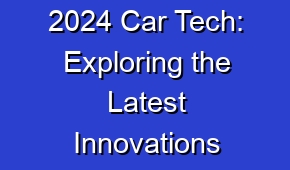Auto Industry’s Emerging Trends: What to Expect

Stay ahead of the curve with our insights into the emerging trends in the auto industry. From electric vehicles to autonomous driving, we explore the latest innovations shaping the future of transportation. Discover how technology and changing consumer preferences are revolutionizing the way we drive and experience cars.
The auto industry is experiencing a rapid transformation due to emerging trends that are reshaping the way we think about transportation. One of these trends is the rise of electric vehicles, which are becoming increasingly popular as consumers seek more sustainable and eco-friendly options. Another key trend is the development of autonomous driving technology, which promises to revolutionize the way we travel by eliminating the need for human drivers. Additionally, ride-sharing services like Uber and Lyft are gaining traction, providing convenient and cost-effective alternatives to traditional car ownership. The industry is also witnessing advancements in connected cars, with vehicles equipped with internet connectivity and advanced features that enhance safety and convenience. Lastly, there is a growing focus on alternative fuels such as hydrogen and natural gas, as companies strive to reduce carbon emissions and combat climate change. These emerging trends are driving innovation and shaping the future of the auto industry.
| Emerging trends in the auto industry include electric vehicles and autonomous driving technology. |
| The use of artificial intelligence is becoming more prevalent in the auto industry. |
| Sustainable materials are being used to create more eco-friendly vehicles. |
| The shift towards ride-sharing services is changing the way people think about car ownership. |
| Connected cars are becoming increasingly popular, with advanced features and connectivity. |
- The adoption of electric vehicles is expected to increase in the coming years.
- Autonomous vehicles are being developed to enhance safety and convenience on the roads.
- The integration of smartphone technology into cars allows for seamless connectivity and enhanced user experience.
- The focus on sustainable practices is driving the development of more fuel-efficient and environmentally friendly vehicles.
- The emergence of subscription-based models is changing how consumers access and use automobiles.
What are the Emerging Trends in the Auto Industry?
Emerging trends in the auto industry refer to the new and developing changes and advancements that are shaping the future of the automotive sector. These trends are driven by various factors such as technological advancements, changing consumer preferences, environmental concerns, and government regulations.
| Electric Vehicles (EVs) | Autonomous Driving | Connected Cars |
| Increasing popularity of electric vehicles as an alternative to traditional gasoline-powered cars. | Rapid advancements in self-driving technology, leading to the potential for fully autonomous vehicles in the near future. | Integration of cars with internet connectivity, allowing for features such as GPS, entertainment systems, and remote control. |
| Government incentives and regulations promoting the adoption of EVs. | Improved safety and efficiency through autonomous driving systems. | Enhanced user experience and convenience with features like real-time traffic updates and remote vehicle management. |
| Expansion of charging infrastructure to support the growing number of EVs. | Potential reduction in accidents and traffic congestion through optimized autonomous driving. | Data collection and analysis for personalized services, predictive maintenance, and improved vehicle performance. |
One of the key emerging trends in the auto industry is the shift towards electric vehicles (EVs). With the increasing focus on sustainability and reducing carbon emissions, many automakers are investing heavily in EV technology. This includes the development of more efficient batteries, expanding charging infrastructure, and introducing a wider range of electric vehicle models.
How is Connectivity Impacting the Auto Industry?
Connectivity is revolutionizing the auto industry by enabling vehicles to be connected to the internet and other devices. This allows for enhanced features such as real-time navigation, remote vehicle monitoring, and integration with smart home devices.
- Increased safety: Connectivity in automobiles has led to the development of advanced safety features such as automatic emergency braking, lane departure warning, and blind spot detection. These features use connectivity to gather real-time data and provide alerts or take corrective actions to prevent accidents.
- Enhanced driver experience: Connectivity has revolutionized the driving experience by providing access to a wide range of features and services. With in-car connectivity, drivers can access navigation systems, music streaming services, voice commands, and even make hands-free calls. This improves convenience and entertainment for drivers and passengers.
- Improved vehicle performance: Connectivity allows for remote diagnostics and software updates, enabling automakers to monitor the health and performance of vehicles in real-time. This helps identify potential issues before they become major problems, leading to improved reliability and performance of automobiles.
One of the major impacts of connectivity is the rise of connected cars. These vehicles can communicate with each other and with infrastructure systems, providing valuable data for traffic management and improving overall road safety. Additionally, connectivity enables over-the-air software updates, allowing automakers to continuously improve vehicle performance and add new features without requiring physical upgrades.
What Role Does Artificial Intelligence Play in the Auto Industry?
Artificial intelligence (AI) is playing a significant role in transforming the auto industry. AI-powered technologies are being used for various applications, including autonomous driving, predictive maintenance, and personalized user experiences.
- Autonomous Driving: Artificial intelligence is used in the auto industry to develop self-driving cars. AI algorithms analyze sensor data from cameras, radar, and lidar to make decisions and control the vehicle.
- Driver Assistance Systems: AI is used to power advanced driver assistance systems (ADAS) such as adaptive cruise control, lane-keeping assist, and automatic emergency braking. These systems use AI to detect and respond to potential hazards on the road.
- Vehicle Maintenance and Diagnostics: AI is used to analyze data from sensors in vehicles to detect potential issues or failures. This allows for predictive maintenance and reduces downtime for repairs.
- Personalized User Experience: AI is used to personalize the driving experience by analyzing data such as driving habits, preferences, and biometrics. This allows for customized settings and recommendations for each driver.
- Optimizing Manufacturing Processes: AI is used in the auto industry to optimize manufacturing processes, such as quality control, supply chain management, and predictive maintenance in factories. This improves efficiency and reduces costs.
AI enables self-driving cars to perceive and interpret their surroundings, making real-time decisions based on the data collected from sensors and cameras. It also helps in predicting and preventing potential vehicle failures through advanced analytics and machine learning algorithms. Furthermore, AI can personalize the driving experience by analyzing user preferences and providing customized features and recommendations.
How are Electric Vehicles Impacting the Auto Industry?
Electric vehicles (EVs) are having a significant impact on the auto industry. They offer several advantages over traditional internal combustion engine (ICE) vehicles, including lower operating costs, reduced emissions, and improved energy efficiency.
| Reduced Environmental Impact | Advancements in Technology | Changing Market Dynamics |
| Electric vehicles produce zero tailpipe emissions, reducing air pollution and greenhouse gas emissions. | EVs have seen significant advancements in battery technology, range, and charging infrastructure. | The shift towards electric vehicles is leading to changes in consumer preferences and market competition. |
| EVs contribute to reducing dependence on fossil fuels and promoting renewable energy sources. | Technological innovations in EVs are driving research and development in the auto industry. | Automakers are investing in electric vehicle production and expanding their EV product line. |
| Government incentives and regulations are supporting the adoption of electric vehicles. | EVs are paving the way for autonomous driving and connected vehicle technologies. | The growing demand for electric vehicles is impacting the sales and profitability of traditional automakers. |
The increasing demand for EVs is driving automakers to invest in research and development to improve battery technology, increase driving range, and reduce charging times. Additionally, governments around the world are implementing incentives and regulations to promote the adoption of electric vehicles, further accelerating their growth.
What are the Key Challenges in the Auto Industry?
The auto industry faces several challenges as it adapts to emerging trends and transitions towards new technologies. One of the key challenges is infrastructure. The widespread adoption of electric vehicles requires a robust charging infrastructure that is easily accessible and convenient for consumers.
The key challenges in the auto industry include electric vehicle adoption, autonomous driving technology, and changing consumer preferences.
electric vehicle adoption, autonomous driving technology, changing consumer preferences
Another challenge is the cost of new technologies. Electric vehicles and autonomous driving systems often come with a higher price tag compared to traditional vehicles. Automakers need to find ways to make these technologies more affordable and accessible to a wider range of consumers.
How is Sustainability Influencing the Auto Industry?
Sustainability is a major influence on the auto industry. With increasing concerns about climate change and environmental impact, automakers are focusing on developing more sustainable vehicles and manufacturing processes.
Sustainability is driving the auto industry to develop eco-friendly vehicles, reduce emissions, and promote renewable energy sources.
This includes the use of alternative materials, such as lightweight composites and recycled materials, to reduce the carbon footprint of vehicles. Additionally, automakers are exploring renewable energy sources for vehicle charging and implementing sustainable practices in their production facilities.
What is the Future of Mobility in the Auto Industry?
The future of mobility in the auto industry is characterized by shared and autonomous transportation. The rise of ride-sharing services and the development of autonomous vehicles are reshaping the way people travel.
Increased Adoption of Electric Vehicles
The future of mobility in the auto industry is expected to see a significant increase in the adoption of electric vehicles (EVs). With advancements in battery technology and the growing concern for environmental sustainability, EVs are poised to become the primary mode of transportation. This shift towards electric mobility is driven by factors such as government incentives, decreasing costs of EV production, and the need to reduce carbon emissions. As a result, we can expect to see a surge in the development and availability of EV charging infrastructure, making it more convenient for consumers to own and operate electric vehicles.
Rise of Autonomous Vehicles
Another major trend in the future of mobility is the rise of autonomous vehicles. Self-driving cars have the potential to revolutionize the way we commute, making transportation safer, more efficient, and convenient. With advancements in artificial intelligence and sensor technology, autonomous vehicles are becoming increasingly capable of navigating roads without human intervention. This technology has the potential to transform the auto industry, leading to changes in car ownership models, increased productivity during commutes, and improved traffic management systems.
Growth of Mobility-as-a-Service (MaaS)
The concept of Mobility-as-a-Service (MaaS) is expected to gain traction in the future of mobility. MaaS refers to the integration of various transportation services into a single platform, providing users with seamless and convenient access to different modes of transportation. This includes services such as ride-hailing, bike-sharing, public transportation, and more. MaaS aims to provide a more sustainable and efficient alternative to private car ownership, reducing congestion and improving overall transportation accessibility. As technology continues to advance, we can expect to see the growth of MaaS platforms and increased collaboration between traditional auto manufacturers and mobility service providers.
Shared mobility services, such as car-sharing and ride-hailing, offer convenient alternatives to traditional car ownership. Autonomous vehicles have the potential to further transform mobility by providing on-demand transportation without the need for a human driver. This can lead to increased efficiency, reduced traffic congestion, and improved accessibility for individuals who cannot drive.





















